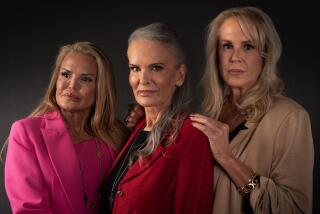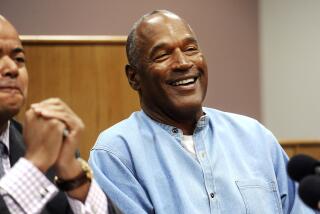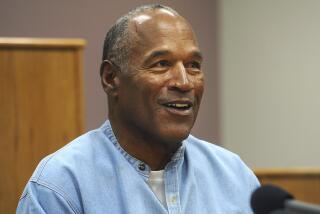Will the ‘Real O.J.’ Please Stand Up
- Share via
“Mr. Simpson, who is the real O.J.?” attorney Michael Brewer asked Tuesday.
The question was unusually soft, especially coming from a plaintiffs’ lawyer seeking Simpson’s defeat in the wrongful-death trial.
Some of my colleagues thought it was a mistake. Perhaps, but it reminded me of the easy questions reporters throw during tough interviews, hoping to surprise the interviewee into a candid answer. In this case, the question served to establish a standard: Simpson’s view of himself, against which the jurors could consider other testimony and pass judgment on him.
Simpson took his standard from the Book of Matthew--the Golden Rule, which, in its common form, says: “Do unto others as you would have others do unto you.”
As Simpson put it: “I like to think I was a guy, including Nicole when we were together and when we weren’t, people could come to. I like to think I treated everybody the way I wanted to be treated. My basic philosophy was ‘do unto others.’ If people had problems, they came to me.”
But there’s another side to the man who asked to be judged by the Golden Rule.
*
Simpson was calm and controlled as he testified Friday, Monday and for part of Tuesday morning.
“As a man, O.J. Simpson has spent a lifetime cultivating the image of a guy who is not only talented but also genuinely personable,” his criminal defense attorney, Johnnie L. Cochran Jr., wrote in his book “Journey to Justice.”
Simpson did this, Cochran continued, “not because he is a brilliant actor but because he really is both talented and personable.”
Personable--and rehearsed too. Simpson was forced to admit under questioning that lawyers from San Francisco came down to help prepare him for the civil trial examination.
As Simpson had learned in the movies, rehearsals help even the worst actors. His answers were brief, for the most part. He got into trouble only when he talked too much.
Significantly, that’s what happened when it came to the subject that is the heart of this case: his relationship with women.
At first, Simpson sounded reasonable, as though he had pretty well mastered the politically correct talk of a reformed wife-beater following his plea of no contest to beating Nicole in 1989.
Simpson testified that after sessions with Dr. Lenore Walker, a psychologist and expert on battered women, he said he now knows, “I physically tried to impose my will on Nicole. I shouldn’t have done that.”
But, as plaintiffs’ attorney Daniel Petrocelli knew he would, O.J. talked and talked and talked.
Recounting his fight, Simpson referred to it as a “rassling match,” as if he and another one of the guys from the Buffalo Bills had had a locker room disagreement.
Moreover, Simpson said Nicole shared the blame for an encounter that left her face bruised and cut--cuts he said might have come from her picking at blemishes during her nightly facial cleansing. “The physical side of it was initiated by Nicole,” he said. “I was wrong in the way I reacted.”
He said that “at times I felt battered,” and that they had learned in therapy “that we were abusive to each other.” After the incident, Simpson said, he felt battered “numerous times and I kept a log on it.”
What a memory for the jury: A star NFL running back, keeping a log on each time his spouse battered him. I don’t think he’d show that log around the Bills locker room.
An incident related by author Lawrence Schiller in his book on the case, “American Tragedy,” tells even more about Simpson’s attitude toward women.
When the criminal trial jury was visiting Simpson’s estate, he stood outside with sheriff’s deputies. An alternate juror passed by.
“Oh man, look at her in those pants,” said a leering Simpson, as described by Schiller. “I want to get at her.” A deputy said, “Yeah, she’s hot, but she’s so stupid.” Simpson replied, “I don’t care how stupid she is. Look at her in those jeans.”
Simpson’s attitude toward women in general, and Nicole in particular, was the side of him hidden from the public and even from friends.
It’s this side of Simpson that troubled his sidekick Bob Kardashian, who collaborated with Schiller in the preparation of “American Tragedy.”
Schiller wrote, “Bob realizes that if Simpson has withheld and hidden and disguised so much of himself for so many years, he must be hiding more now. Bob started out believing in O.J.’s innocence. But over the months, he has begun to doubt. . . .”
*
Winning a trial, good lawyers say, requires the telling of a convincing story.
Questioning Simpson, the plaintiffs’ attorneys related a harrowing tale of a jealous, woman-chasing, wife-beating killer hiding behind a personable exterior.
Simpson told the story of a man who follows the Golden Rule.
The jury will decide which one is the real O.J.
More to Read
Sign up for Essential California
The most important California stories and recommendations in your inbox every morning.
You may occasionally receive promotional content from the Los Angeles Times.













